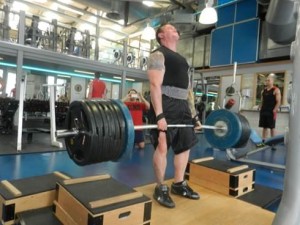Introducing Lawrence Farncombe – Former British and European Powerlifting Champion turned UKSCA Strength Coach To Top Class Athletes
An opportunity presented itself to me a few weeks ago, when, upon scrolling through my twitter feed, I came across a request from a PR firm to get in touch should any fitness bloggers / journalists be interested in interviewing a former British and European Powerlifting champion turned certified UKSCA Strength Coach to an array of athlete’s across various sporting disciplines.
Given that the profiles section of this blog often shines the spotlight on individuals within the fitness and sporting world (regardless of experience or status) across the many different disciplines available to us today, I immediately jumped at the chance to gain a rare insight into a former powerlifters career. With that said, it is with great pleasure to introduce to you Lawrence Farncombe…
Throughout his 18 year long career as a UKSCA Strength Coach, Lawrence has pushed himself further by picking up other credentials related to his role including Strength and Conditioning accreditation, Specialist Biomechanics Coach, PICP level 4, International Strength and Conditioning Coach and a GBPF powerlifting coach.
Although his own sporting accomplishments consist of winning British and European Powerlifting Championships, he is especially proud of his work with top athletes, which many of whom have gone on to achieve a range of sporting accolades including four World, European and English Champions as well as eight British Champions in a variety of sporting disciplines. Lawrence has also helped athletes win tournaments, divisional championships and has worked with numerous fighters on both amateur and professional levels.
I caught up with Lawrence yesterday to discuss how he first got involved with powerlifting whilst at the same time gaining a valuable insight into the life of a qualified Strength Coach training top athletes.
I began the interview with the most obvious question…
What made you choose the sporting discipline commonly known as power lifting as your preferred method of keeping fit?
I did not initially choose powerlifting – it was more of the case that it chose me! On a few occasions other experienced power-lifters where I was training would comment on my strength and would suggest I try powerlifting as they could see I had potential.
In many ways this has been the same path for my female power-lifting athletes who began training with me and have gone on to be very successful.
When you embarked on this fitness journey, was it always with the intention to compete professionally or did the opportunity come about naturally?
When I first started training I had no intention to compete nationally or internationally, but when the opportunity presented itself to me I decided it would be a great way to further increase my knowledge and motivation to keep training.
You are a former British and European Powerlifting Champion. What pressures (if any) did you experience whilst training and competing as a professional athlete?
The main pressure I felt when I was competing regularly was finding the time to both work and train but I think this is a struggle everyone faces when they are an athlete or a fitness enthusiast.
How big an impact did diet and nutrition play whilst competing?
It was extremely important to be disciplined with my nutrition as it played a significant part role when competing, as l often had to drop pounds to make weight categories. This meant being as intelligent as possible with my nutrition so not to lose strength during competitions
What methods did you use to stay calm and get mentally prepared for an event as big as the European Championships?
My mental attitude for competitions is quite good as I generally don’t struggle with the pressure! I actually use the nerves to help me perform at a higher level and although sometimes I had trouble getting to sleep the night before I would just focus on doing my best on the day and not wasting precious energy by worrying.
What was your favourite lift to perform and why?
My favourite discipline is the deadlift simply because in my opinion it really is the ultimate test of strength, and if I’m being honest technically it’s not the most complicated.
What was your least favourite lift to perform?
My least favourite lift was the squat because this is the most technically demanding. If your extrinsic mechanics are not correct you will never be able to perform to your true capabilities.
What led to the decision to stop competing in favour of beginning a career as a qualified strength coach?
I was actually strength coaching athletes for some time before I stopped competing. Due to my powerlifting background, and the fact I was a trainer with a good understanding strength training methodologies, I would often get approached by athletes to increase their strength.
From the mid-90s to the start of this century there were not many strength coaches in the UK, let alone anywhere in the west, so quality information was scarce. I found I enjoyed helping other people achieve their goals far more than I found satisfaction for achieving my own.
Out of all the mentors you have had throughout your career, who has been the most influential?
Oh that’s a hard one as I have been lucky enough to have some great mentors in my life from boxing, kickboxing and strength coaching. I’d have to say the biggest impact was from Charles Poliquin, simply because it was his influences that made me really refine my skills as a strength coach.
For those that may not be familiar, what are the main differences between a qualified personal trainer and a qualified strength coach?
Although in the UK you can become a personal trainer in as little as six weeks, to become an accredited strength coach, or to obtain a master’s degree in strength and conditioning can take anywhere from 3 to 5 years.
However, even then you cannot necessarily call yourself a strength coach just because you hold an accreditation or a degree – you really have to put the time and effort in to show performance related results with athletes.
It would appear that a strength coach’s knowledge and expertise is geared towards getting the best out of professional athletes. What benefit would a regular fitness enthusiast and gym-goer like me gain in recruiting a strength coach?
Fitness enthusiasts and gym goers could get great results if they’re lucky enough to find a coach to privately to work with them, simply because good strength coaches have the knowledge to correctly periodize your training systems to produce the fastest, safest and most effective results possible.
You have had the pleasure of training an array of sporting professionals across various disciplines that has gone on to win World Championship and European Championships to name a few. If you had to choose, what sporting disciplines do you find the most fascinating to work with?
I enjoy working with boxers the most, simply because in some ways the sport is still in virgin territory for strength and conditioning. I feel I have created a blueprint for fighters to get the best results possible from their training which they can transfer to the ring.
*below is a short video clip of Lawrence putting pro boxer Jovan Young through his paces during one of Jovan’s S&C sessions with him*
You have travelled the world throughout your 18 year career, what place has been the most memorable you have visited?
I always enjoy visiting America which is fortunate because I always seem to be over there at least a few times every year! The people are friendly, the food is very diverse and the gyms are awesome.
What advice can you give someone that maybe interested in choosing a career as a strength coach?
I think this must be one of the hardest careers you could ever choose. It is extremely demanding as your life isn’t your own – it’s all about your athletes. However, at the same time it is very rewarding seeing someone you have mentored, coached and inspired when they’re winning World Championships. If you enjoy the journey then every day is a reward.
*interview concludes*
It is clear from this interview that Lawrence has a burning passion to help others achieve optimal strength and fitness beyond their own expectations, which results in bringing out the best of those fortunate enough to work with him.
As he mentioned in his last question, the role of a strength coach is extremely demanding for they would often have to sacrafice pretty much a huge chuck of their 24 hour day working with their athlete’s thus having hardly any personal time for themselves (pretty tough if one has a family or living with a loved one).
If you are an aspiring powerlifter / strength coach yourself, or know someone that is thinking of choosing this as their chosen sporting discipline / career path, I hope this interview has given you a brief insight into what it takes to become successful in these fields. Looking at Lawrence’s array of credentials, it is clear he loves what he does and has spend many years perfecting his craft in order to get the very best performance out of others.
Should you want to find out more about Lawrence, including useful tips and information about Strength and Conditioning, Lawrence Farncombe can be found online by visiting the Strength Coach Farncombe website , Strength Coach Farncombe Facebook page or by simply following him on Twitter.
Stay tuned for the next installment where I will be catching up with an inspiring lady that has achieved a great milestone having successfully ran 7 marathons on 7 continents! *an interview not to be missed if you are an aspiring marathon / ultra runner*
Until then, continue having a great day beautiful people! 🙂
Google+


